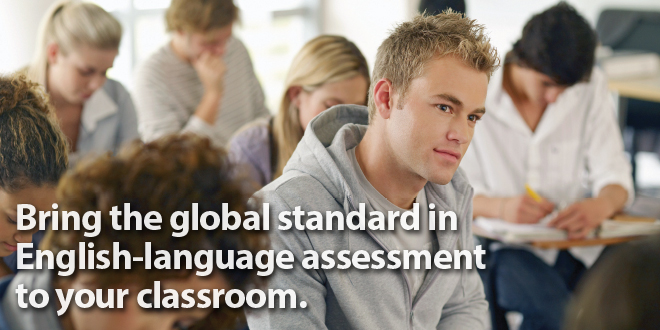About TOEFL ITP
About TOEFL ITP® tests

Gives You Real Insight Into Student Performance
The TOEFL ITP® Assessment Series offers colleges and universities, English language learning programs and other organizations the opportunity to administer a convenient, affordable and reliable assessment of English-language skills.
The TOEFL ITP® tests can be used for placement, progress, evaluation, exit testing and other situations. By using the TOEFL ITP® tests in your classroom, you can keep your students on track and have confidence in their real-world abilities.
Empowers Your Teaching
When you use the TOEFL ITP® tests, you’ll assess your students’ proficiency level in three different skills — reading comprehension, listening comprehension, and structure and written expression. You’ll be able to pinpoint the areas in which they need help, so you can tailor your teaching to meet those needs.
Knowing your students’ English skill levels better today gives them the best chance for success tomorrow.
Based on the Power of the TOEFL® Test
When you use the TOEFL ITP® assessments, you put the power of the TOEFL® test to work in your classroom. The TOEFL ITP® assessments share the same rich heritage as the TOEFL® test — the world’s most widely accepted and respected English-language assessment.
The two tests are used for separate purposes and administered differently. The TOEFL® test is a high-stakes exam administered by ETS. Institutions use TOEFL® test scores to make high-stakes decisions, such as student admissions.
Seven Ways You Can Use the TOEFL ITP® Assessment Series In Your Classroom
- Placement in intensive English-language programs requiring academic English proficiency at a college or graduate level.
- Progress monitoring in English-language programs stressing academic English proficiency.
- Exiting English-language programs by demonstrating proficiency in English listening and reading.
- Admissions to short-term, non-degree programs in English-speaking countries where the sending and receiving institutions agree to use TOEFL ITP® scores.
- Admissions to undergraduate and graduate degree programs in non-English speaking countries where English is not the dominant form of instruction.
- Admissions and placement in collaborative international degree programs where English-language training will be a feature of the program.
- Scholarship programs, as contributing documentation for academic English proficiency.
The TOEFL ITP® Assessments at a Glance:
| Level 1 (intermediate to advanced) |
| Section |
No. of QN. |
Admin. Time |
Score Scale |
| Listening Comprehension |
50 |
35 minutes |
31 - 68 |
| Structure and Written Expression |
40 |
25 minutes |
31 - 68 |
| Reading Comprehension |
50 |
55 minutes |
31 - 67 |
| TOTAL |
140 |
115 minutes |
310 - 677 |
| Level 2 (high beginning to intermediate) |
| Section |
No. of QN. |
Admin. Time |
Score Scale |
| Listening Comprehension |
30 |
22 minutes |
20 - 50 |
| Structure and Written Expression |
25 |
17 minutes |
20 - 50 |
| Reading and Vocabulary |
40 |
31 minutes |
20 - 50 |
| TOTAL |
95 |
70 minutes |
200 - 500 |
Speaking
The TOEFL ITP Speaking test evaluates the skills needed to speak English in everyday situations, as well as some basic campus and academic settings. It consists of 4 tasks:
- 1 read aloud task
- 2 independent speaking tasks
- 1 integrated speaking task
Note: The Speaking test is only available with the digital TOEFL ITP Level 1 or Level 2 test.
- Testing time: Approximately 15 minutes
- Number of tasks: 4
- Score range: 31–68
*** Beginning May 2022, the TOEFL ITP public tests in Hong Kong would be digital and delivered remotely (with Bring Your Own Proctor, BYOP), and each public test must include BOTH the TOEFL ITP Level 1/Level 2 test AND Speaking test. ***
Content and Settings for the TOEFL ITP Tests
Academic Topics
- Arts: fine arts, crafts, theater, dance, architecture, literature, music, film, photography
- Humanities: history, political science, government, philosophy, law
- Life Sciences: paleontology, biochemistry, animal behavior, ecology, anatomy, physiology, genetics, health science, biology, agriculture
- Physical Sciences: geology, astronomy, chemistry, Earth science, engineering, meteorology, energy, technology, oceanography, physics
- Social Sciences: anthropology, sociology, education, geography, archaeology, psychology, economics, business, management, marketing, communications
Campus-life Topics
- Classes: class schedules, class requirements, library references, assignments (papers, presentations, readings), professors, studying, field trips
- Campus administration: registration, housing on and off campus, study abroad, internships, university policies
- Campus activities: clubs, committees, social events
General Topics
- Business: management, offices, official documents, law
- Environment: weather, nature, climate, environment
- Food: types of food, restaurants
- Language and communication: mail, email, phone use, leaving messages, requests for information
- Media: TV, internet
- Objects: descriptions of objects, equipment
- Personal: family members, friends, health, emotions, physical characteristics, daily routines
- Planning and time management: future events, invitations, personal schedules
- Purchases: clothing, shopping, banking, money
- Recreation: sports, games, concerts, plays, art, books, photography, music, parties and gatherings, public lectures
- Transportation: travel, driving, parking, public transportation, travel reservations
- Workplace: applying for a job, on-campus employment, work schedules
TOEFL ITP Speaking Score Report features
- Distributed by the EPN
- Speaking score with performance descriptors and CEFR level




